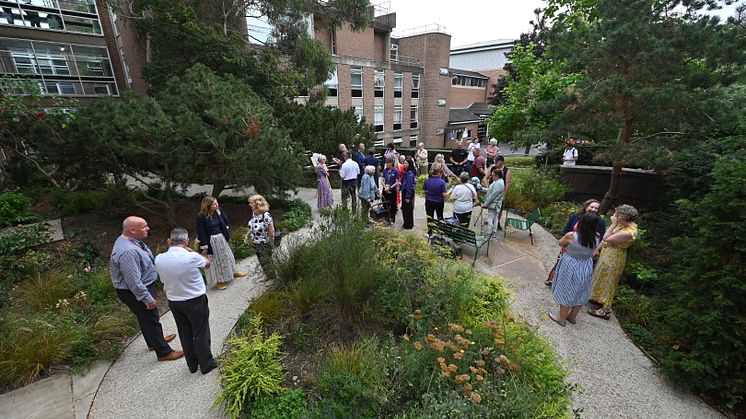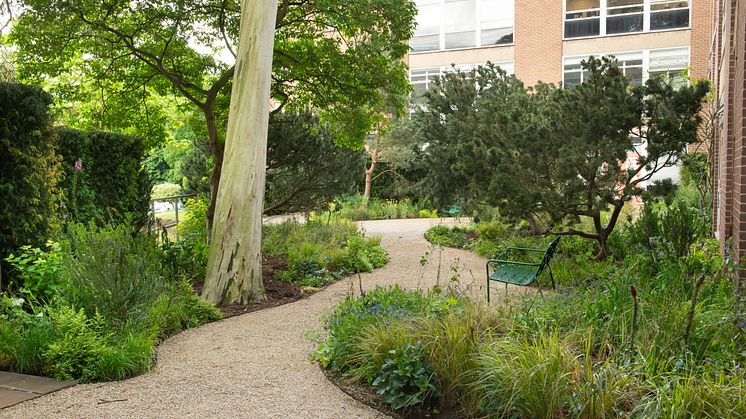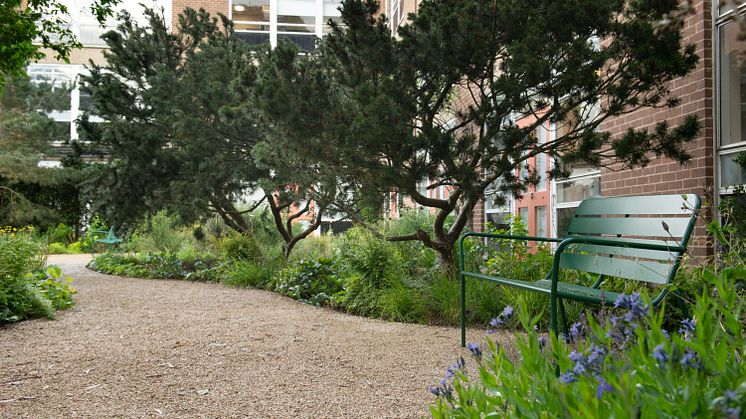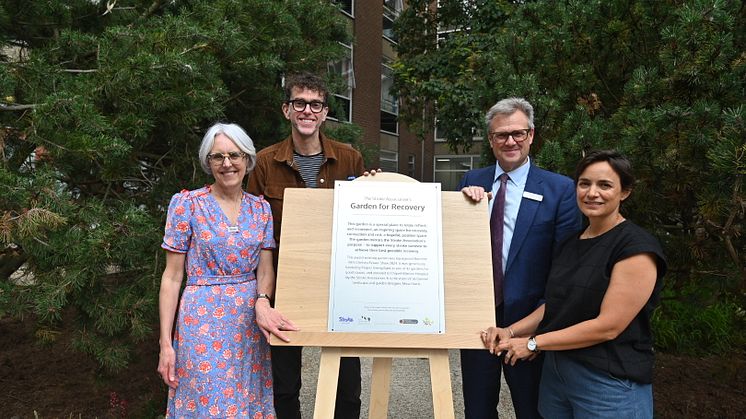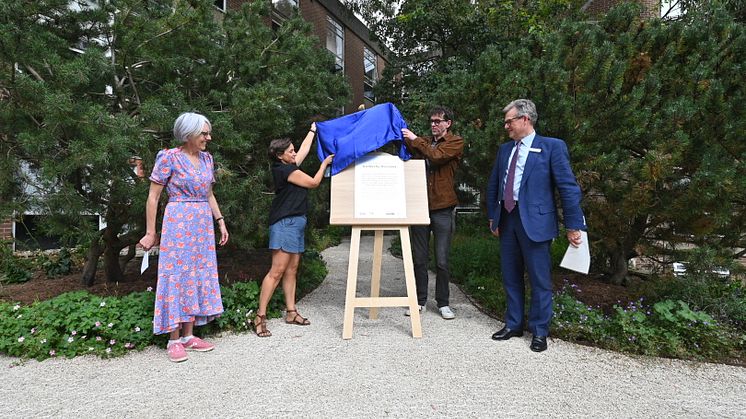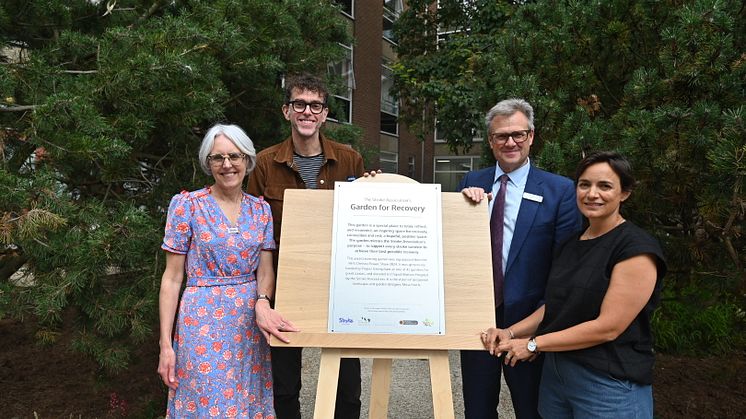
Press release -
RHS Chelsea Flower Show Garden officially launches at Chapel Allerton Hospital in Leeds
Stroke patients celebrated the official opening of the Stroke Association’s Garden for Recovery at Chapel Allerton Hospital in Leeds, on 13 August 2024. They were joined by the garden’s RHS Chelsea Flower Show and award winning landscape designer, Miria Harris, herself a stroke survivor, and Emmerdale star Mark Charnock, who plays stroke survivor Marlon Dingle on the ITV show.
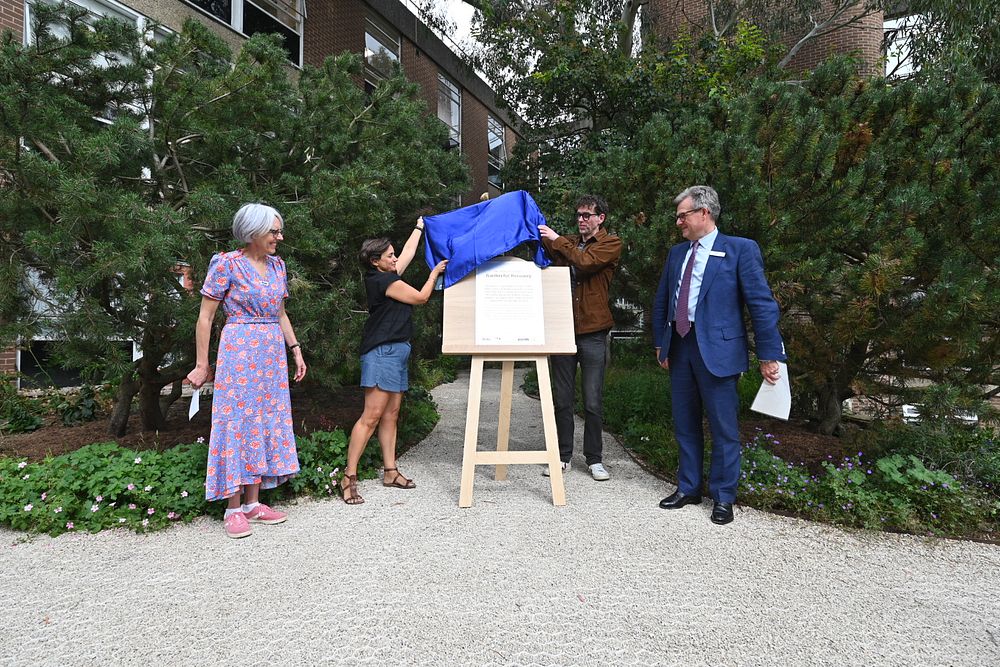
The Garden for Recovery was the charity’s first ever show garden at the RHS Chelsea Flower Show, which wowed show visitors from 21-25 May 2024. It was made possible thanks to funding from grant-giving charity Project Giving Back that funds gardens for good causes at RHS Chelsea Flower Show, and was created by landscape designer Miria Harris to support stroke survivors to achieve their best possible recovery.
It has since been reconfigured and moved to its permanent location next to the stroke unit at Chapel Allerton Hospital in Leeds, where it will provide a place for connection and rest for stroke survivors and their families. The garden is visible from the windows of the hospital, offering an inspirational view of windswept, resilient trees and wildlife-friendly plants.
The garden has been shaped by Miria’s own experience of stroke in 2019, which left her with aphasia, affecting her ability to speak and form words properly, and the stories of other stroke survivors, as a place to support and inspire stroke recovery, both physically and mentally.
Miria says: “Stroke can change your life profoundly. It did mine. Although physically, everything repaired quite quickly, mentally, the traumatic response went on for quite a long time. There’s a whole new layer of vulnerability and anxiety that exists in my life that never existed before.
“It is definitely not as simple as just getting better. There are many bumps in the road and recovery is not linear. But with support, there’s hope. I wanted to design an immersive, calm and optimistic space to support stroke survivors of all ages and needs. Somewhere for visitors to gently move around, to take time to stop, rest and reflect. It’s a place to be alone or connect with loved ones.”
The garden is a welcoming, accessible, peaceful and sensory space for recovery. Colour and scent provide soft way-finding for those with visual or mobility needs, while interconnected pathways offer different routes through the garden, with different areas to rest along the way.
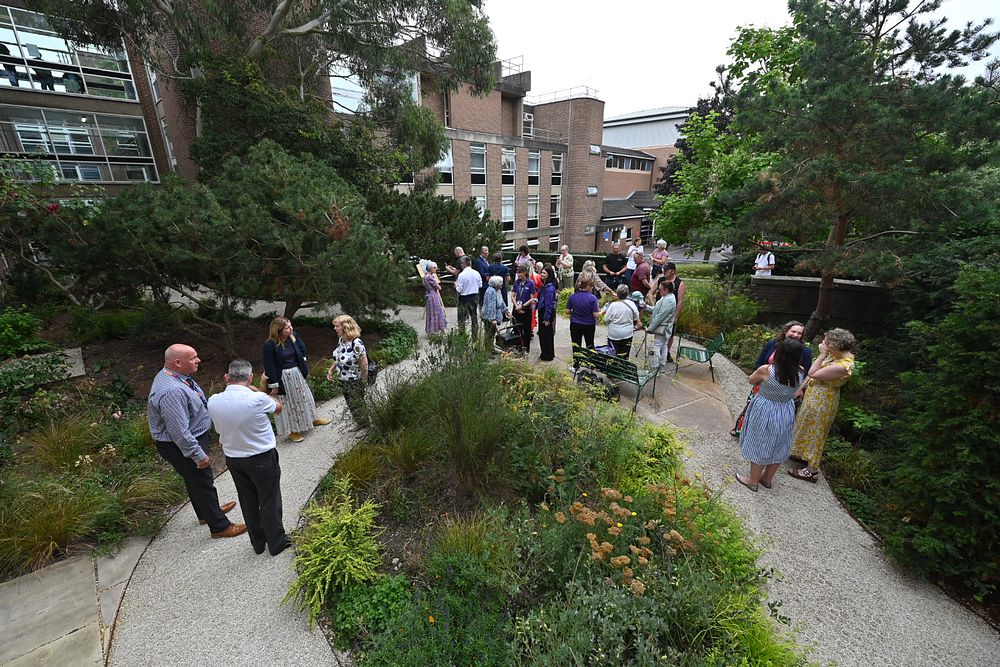
Over 88,000 people survive a stroke every year in the UK, but surviving a stroke is just the start of a long and traumatic battle to finding their way back to life. Mums, dads, grandparents, young people, even children can be stroke survivors, and the impact of stroke on them and their loved ones can be catastrophic. A stroke can leave survivors unable to move, see, speak, or even swallow.
Miria continues: “After the disconnecting experience of stroke, the reconnection with people I love and with nature has been hugely important. My story and the stories that I have learned from speaking to other survivors have been the inspiration for this garden. They have shaped the garden’s themes and have directly influenced the material choices I have made in the design.
“Redesigning the garden for Chapel Allerton Hospital has been one of the most uplifting experiences of my professional life. Being able to see first-hand how much joy the plants and flowers from the Chelsea Flower Show garden are bringing to the stroke unit’s patients, staff and visitors is incredible special and I will never forget the kindness and enthusiasm for the project that I have experienced.”
The Stroke Association is the leading stroke support charity in the UK. From providing vital stroke support services, to funding pioneering stroke research, the Stroke Association supports stroke survivors to achieve their best possible recovery.
Juliet Bouverie OBE, Chief Executive of the Stroke Association, said: “Through tailored, coordinated and empowering stroke support, the Stroke Association helps survivors and their loved ones to find their way back to life. We provide support that covers every aspect of a stroke survivor’s recovery, so they are not just living to survive, but able to live life again.
“We are thrilled that our beautiful show garden has been relocated from the RHS Chelsea Flower Show to the stroke unit at Chapel Allerton Hospital. The garden provides a tranquil place for patients to rest and reflect, but also connect with loved ones in a way that might not normally be possible within the hospital, which will be hugely beneficial to their recovery. Miria has created a very special, lasting legacy which will support stroke survivors for many years to come.”
Craige Richardson, Director of Estates and Facilities, at Leeds Teaching Hospitals NHS Trust, said: “Having the Stroke Association’s Garden for Recovery at Chapel Allerton Hospital is hugely beneficial to our patients and positively impacts the environment. Not only does the garden provide patients and staff with direct access to nature, which is known to have a positive impact on recovery and wellbeing, it also increases the biodiversity of the landscape and enhances green infrastructure, a building block for climate resilience that supports our longer-term Sustainability commitment.”
Kevin Doughty, is currently a patient on the stroke unit at Chapel Allerton Hospital. He said: “The garden is a lovely place for people like me and my family to use to help with my recovery. It's very peaceful and helps me reconnect with the outside world and build confidence while having rehabilitation therapy."
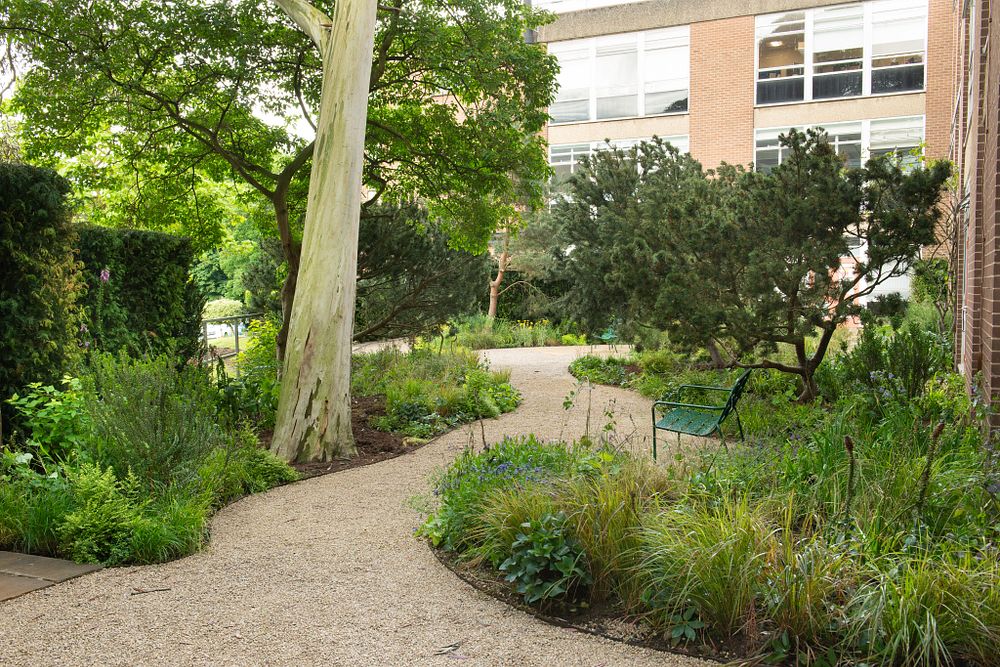
More about the garden
One of the garden’s key focal points is the pine trees, which were rescued from a forgotten nursery field and nursed back to health. Their windswept shapes symbolise the resilience of stroke survivors and their loved ones.
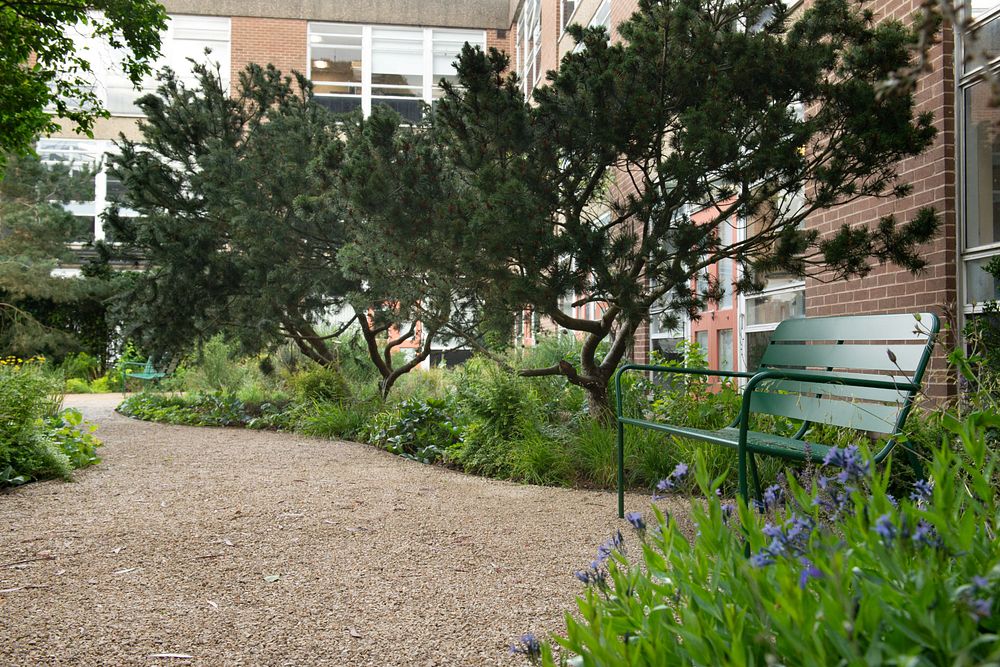
The trees, with their gently twisted branches, are strongly emblematic of the stroke recovery process. It’s not linear or straightforward or perfect, but it is possible. As well as creating a visual impact, the pines have been chosen for the transportive nature of their scent, which is the direct opposite of the clinical smell of hospitals.
The garden features loose muted rainbow colour blocked zones, using shrubs, perennials and annuals to help visitors find focus without cluttering the space. One of the key plants Miria has used in the garden is called ‘Honesty’. Miria adds: “There are so many misconceptions about stroke – that it's just something that affects old people or people who have an unhealthy lifestyle. That’s not the case. I’ve included ‘Honesty’ as it has these beautiful, transparent seed heads, which I’ve asked my growers to keep on as I want honesty and transparency about stroke and stroke recovery to be at the heart of the garden.”
The Stroke Association provides a Stroke Recovery Service in Leeds for stroke survivors (including TIAs/mini-strokes), and families and carers of people affected by stroke. Find out more about stroke and the Stroke Association’s Garden for Recovery at www.stroke.org.uk/garden
Topics
Over 88,000 people survive a stroke every year in the UK, but surviving a stroke is just the start of a long and traumatic battle to finding their way back to life.
The Stroke Association is the only charity in the UK providing life-long support for all stroke survivors and their families. We provide tailored support to tens of thousands of stroke survivors each year, fund vital scientific research, and campaign to bring the best care and support for everyone affected by stroke.
Anyone affected by stroke can visit stroke.org.uk or call our dedicated Stroke Support Helpline on 0303 3033 100 for information, guidance or a chat when times are tough.











